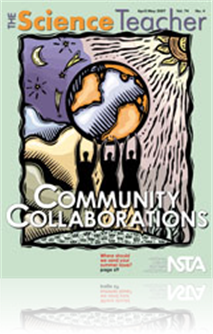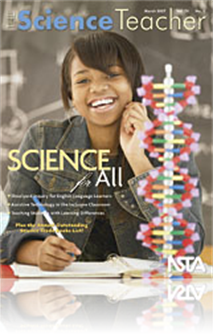All The Science Teacher resources
Journal Article
Idea Bank: Asking Authentic Questions with Tangible Consequences
For physics teachers, it seems irresponsible to teach energy without asking students hard, relevant questions such as, “What will we do when oil becomes prohibitively expensive?” Therefore, in the fall of 2005, the author asked senior-level physi...
Journal Article
Environmental Research Puts Science into Action
The new paradigm for student research should be articulations and collaborations with local governmental, academic, and civic entities. This will enable students to make lasting contributions to bettering their communities through scientific research...
Journal Article
The Gulf of Maine Institute (GOMI) is striving to empower youth to take on stewardship roles in their communities. Through its Community Based Initiative (CBI) program, GOMI addresses environmental degradation by working with teams of students, t...
Journal Article
Ask the Experts—April/May 2007
The experts address the following question in this month’s column: What color is the blood in a person’s veins? I’ve heard it described as “blue,” but it looks to me to be dark red, as it appears when blood is drawn during a lab test....
Journal Article
Idea Bank: Learning Through Stories
While studying gas laws, high school chemistry students at Unionville High School in Kennett Square, Pennsylvania, created children’s books about the properties of gases, geared toward ages 8-12, to display their understanding of the science conten...
Journal Article
Commentary: The Cost of Teacher Turnover in Math and Science
Personnel turnovers can create instability for students, schools, and school districts. What are the costs of these changes? What are the causes of these changes? What information can research contribute to understanding the situation? In October 200...
Journal Article
Assistive Technology in the Inclusive Science Classroom
Assistive Technology (AT) can be any item, piece of equipment, or teacher-made product that is designed to improve a student’s functional capability or help a student succeed in accessing the general education curriculum. Lahm and Morrissette (1994...
Journal Article
Science for ELLs: Rethinking Our Approach
Many educators feel ill-prepared to meet the academic needs of students from culturally and linguistically diverse backgrounds. As educators, we strive to guarantee science education opportunities for all students. Although much remains unknown, cu...
Journal Article
Schoolyard Inquiry for English Language Learners
This article presents outdoor inquiry activities to help English Language Learner (ELL) students learn life science concepts. Through inductive outings, nature journaling, and multicultural gardening, beginner and intermediate students gain science-i...
Journal Article
Career of the Month: An interview with Honey Bee Scientist Eric Mussen
It’s common knowledge that honey bees collect nectar from flowers to make honey. But did you know honey is the only food we consume that is produced by insects? In addition, bees pollinate (fertilize) a staggering one-third of what we eat every day...



